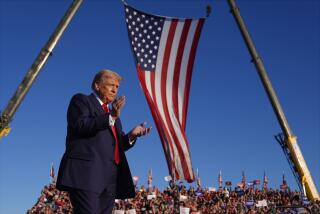No One Noticed Card Law Enactment : How Pennsylvanians Got Gambling: a Fast Shuffle
- Share via
PHILADELPHIA — Down by Benjamin Franklin’s house, they have opened Benjamin’s Casino. On South Street, a British woman in a trim tuxedo deftly deals for a $550 pot. And in Cavanaugh’s scarred and smoky barroom, Nick Margas tells a lunch-bucket crowd, “Gentlemen, place your bets.”
The games are legalized blackjack and tournament poker, and under what may be the nation’s loosest gaming law, Pennsylvania neither taxes nor regulates the play.
By virtually all accounts, it was never supposed to happen. Neither the anti-gambling governor who signed the law, nor the legislative leaders who pushed it, nor the lawmakers who passed it without debate, noticed nor understood the fine print in an obscure liquor regulation that has suddenly brought free-wheeling card games to dozens of hotels, bars and restaurants across Pennsylvania.
“It’s wild! It’s fantastic for us,” said Rich Nasuti, 34, who oversees six card tables at Mars bar and restaurant on South Street. “We’re running seven nights a week. We’ve hired 20 dealers and seven for the bar and security. And we could double this.”
“It’s wild, all right--it’s the Wild West,” said Philadelphia Dist. Atty. Edward G. Rendell. “There are no controls. None. A guy thinks he’s been cheated and boom, you’re going to have bodies lying around.”
Just 60 miles away in Atlantic City, N.J., it took a decade of debate and two statewide referendums to launch strictly controlled casino gambling. In Nevada, state officials license, regulate and tax every owner and game. In California, poker parlors are permitted only after local voters say so and the state attorney general approves the owners.
Not in Pennsylvania.
Under the law, anyone with a liquor license can open a table, anyone with fingers can deal and anyone with money can play. The law specifically says that no license is required. The house takes as much as it wants. The state gets nothing.
“The law has no restrictions,” said Gary DiVito, chief counsel for the state Liquor Control Board, which has issued gambling “guidelines” to help bar owners.
“I think they’re crazy myself,” said Tom Flynn, spokesman for the New Jersey Casino Control Commission. He said the 10 Atlantic City casinos paid $154.5 million to New Jersey last year to aid senior citizens and the disabled.
And in Pennsylvania, where gang wars have left more than 20 mobsters dead since 1980--and where the state lottery was once fixed--there is now considerable concern about crooked card games.
‘At Your Own Risk’
“It could be a big scam,” said one police official who asked for anonymity because the games are, after all, legal. “You walk into a small bar, you don’t know who the dealer is, you don’t know if a shill is next to you, you don’t know if the cards are fixed. You’re at your own risk.”
The law restricts the gaming to “tournaments.” Players pay a fee, ranging from $10 to $500, to buy a set number of chips. After a prearranged number of hands, usually about 10, the two players with the most chips win cash prizes. The house keeps up to one-third of the money.
“If that’s not like casino gambling, I’m Mother Goose,” said Rendell, the district attorney.
Last week, a bipartisan group of state legislators introduced two bills to repeal the law. In a preliminary vote Tuesday afternoon, the state Senate voted 39 to 9 for repeal.
While the gambling goes on, the man to blame or thank is former bar owner Frank J. O’Connell Jr., a Republican state representative. His district embraces the Pocono Mountains resort area, where major hotel owners, including Caesars World Inc., long have clamored for casino gambling.
Last April, O’Connell, a member of a legislative conference committee, inserted the word card in a bill to allow billiards, bowling and darts contests in bars. It meant that card games were also allowed.
Whether O’Connell intended to open the backdoor to blackjack, or whether he simply wanted to enjoy a quiet hand of pitch in the Poconos, as he has said, is not clear. “No comment,” says his Harrisburg office.
“I worked on this bill for 15 months, for 440 hours, and never once was blackjack or poker or casino-type gambling mentioned,” said Dennis J. Nicholson, lobbyist and director of the 2,500-member Pennsylvania Tavern Assn.
“We knew it,” countered Bill Pawliczek, 46, owner of Cavanaugh’s bar and an activist in the tavern association. “Sure we knew what it meant.”
Goes Unnoticed
Either way, the bill, booby-trapped with one four-letter word, sailed unnoticed through the 203-member House and 50-member Senate.
And on May 9, Republican Gov. Richard L. Thornburgh, who says he is unalterably opposed to legalized gambling in the state, signed the card-playing bill into law.
“When he signed it, he obviously didn’t realize it would permit these types of games,” spokesman Jeanne Schmedlen said.
Publicly, Thornburgh is reviewing the law for “unintended consequences,” Schmedlen said. Privately, another aide said, he is “embarrassed as hell.”
But others are enjoying the fun and games at an estimated 50 to 60 bars that have begun dealing for dollars in recent weeks.
More to Read
Sign up for Essential California
The most important California stories and recommendations in your inbox every morning.
You may occasionally receive promotional content from the Los Angeles Times.














